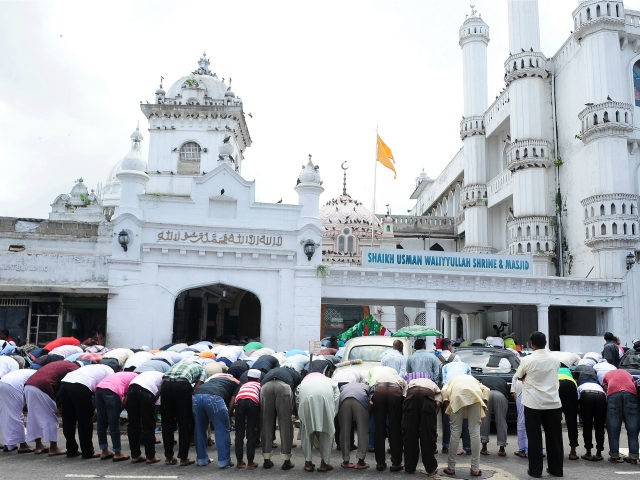Sri Lanka’s Daily Mirror newspaper published a bombshell report Thursday revealing that the suspected Easter jihad mastermind preached in a neighborhood hosting at least 11 mosques known to practice some form of Wahhabism or fundamentalist Islam.
Wahhabism is a traditionally Saudi fundamentalist ideology of Sunni Islam named after Muslim scholar Muhammad bin Abd al Wahhab widely accused of inspiring the birth of several Sunni jihadist groups, such as al-Qaeda, the Islamic State, and the Muslim Brotherhood. The Islamic State has claimed responsibility for the Sri Lanka bombings.
The report casts further doubt on claims by senior Sri Lankan officials that they were not aware of any impending attacks on Christians or threat of jihadi terrorism on their soil. Sri Lankan President Maithripala Sirisena announced Tuesday he had asked for the resignations of his head of national police and secretary of defense after a letter surfaced from Indian intelligence agencies warning prior to the massacre that Islamic terrorists were planning to attack Christians in the country on Easter.
The president denied knowledge of the letter, as did the nation’s prime minister, both condemning the senior intelligence agents who kept the information from them.
Local and international media reports have identified Zahran Hashim, the founder of a Sri Lankan Islamist group known as National Thawheed Jama’ath (NTJ), as the “mastermind” of the attacks. At press time, authorities do not believe he personally conducted any of the six suicide attacks. Some reports claim a man appearing in Islamic State propaganda claiming responsibility for the attack – the only one not covering his face – is Hashim.
In the Daily Mirror report, Hashim’s sister Mohomed Hashim Madaniya claimed the entire Hashim family went “missing” a week before the attacks and distances herself from the suspected jihadist. The alleged current head of the NTJ, Moulavi Thawufeek, also distances the group from Hashim and claims that NTJ had been warning Sri Lankan police for years that Hashim was spreading violent Islamic beliefs through sermons at his mosque.
Hashim is believed to have founded NTJ in 2011. Sri Lankan police still identify him as the leader of the group. Conflicting reports have identified NTJ as a splinter group from a larger similarly named outfit called the Sri Lanka Tawheed Jama’ath, though it is unclear what relationship the groups have or if they ever truly split apart.
Deputy Defence Minister Ruwan Wijewardene went further to say that Hashim’s group “had split from the main body” of the NTJ, which he founded.
Hashim had made a name for himself with thousands of followers on Facebook and Youtube with jihadist screeds calling for violence against non-Muslims. All those speaking to the Daily Mirror claim they distanced themselves from him after he began publishing the videos.
A representative for the Badriya Mosque in Kattankudy, the neighborhood where Hashim preached, told the newspaper that the area hosted nearly a dozen fundamentalist mosques:
Katankudy [sic] a small area of land with one of the highest density of population comprises 63 mosques. 8 of the mosques follow the Fundamentalist strand openly and the other barring 3 mosques follow “different degrees of wahabist ideology” H. M Ameer from the Badriya Mosque told the Daily Mirror. “The Jammiyathul Ulama are also supporters of the Wahabi ideology” he and Jaseem told the Daily Mirror.
Ameer told the newspaper that members of the mosque “informed authorities of [Hashim] starting in 2012.”
“We in fact gave dockets to 11 authorities including the Secretary of Defence, the Inspector General and the Attorney General detailing the extremism carried out by Zahran and his ideology,” Ameer told the Daily Mirror.
Another member of the mosque, Mohomed Jaseem, told the newspaper, “We told them that these guys were preaching some crazy radicalised fundamentalism and that there is a threat to our lives. We did this from as far back as 2012.”
Hashim had reportedly violently attacked a group of Sufi Muslims in 2017 over his belief that they were not radical enough in their faith.
Members of Sri Lankan Prime Minister Ranil Wickremesinghe’s cabinet were the first to report that the government had reason to be aware that jihadists were planning to kill Christians on Easter. Minister of Telecommunications, Foreign Employment & Sports Harin Fernando published a letter on Twitter the day of the attack. He claimed it detailed the threat to Sri Lankan authorities, who did nothing to prevent the attack. He and other cabinet members joined Wickremesinghe in blaming Sirisena’s government for barring them all from regular intelligence briefings, keeping them unaware of the information.
Sirisena claimed on Wednesday that his intelligence officials failed to inform him of the threat, as well, and promised a complete overhaul of security leadership in the country.
Suicide bombers attacked three churches and three hotels known to be frequented by foreigners on Easter, apparently targeting children. Police have arrested at least 24 people in relation to the six bombings at press time. The death toll stands at 359 people, mostly Christians.

COMMENTS
Please let us know if you're having issues with commenting.